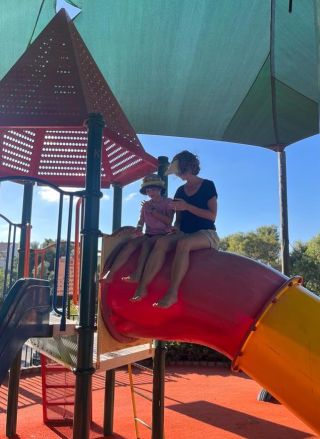Parenting
A Playful Parenting Approach
There is no hack.
Posted October 8, 2023 Reviewed by Hara Estroff Marano
Key points
- Playful Parenting (PP) is our parenting approach and embodies five values:
- Clear, flexible boundaries give children security to explore.
- PP encourages emotional vocabulary with rich relational mastery.
- Curiosity and Joy are active choices that help children feel free in the playground of life.

Co-authored with Galit Romanelli, M.A., Ph.D.-candidate
From the moment that Zach, our eldest, was born we understood we knew nothing about parenting. We tried various approaches, but nothing ever seemed to stick. Eventually, we began applying our relationship model with our kids. Over a decade since we’ve become parents, our parenting approach has become clear, and we call it “playful parenting” (PP).
What Is Play?
First, let's distinguish between game and play. Game (as chess or Monopoly) has a clear goal and rules. Game is binary and dichotomous: Yes/no, win/lose. Parenting is a game with the clear goal of raising happy, functioning children. Game is the what, the framework. Play is how we approach the game. It’s a soft perception of reality in which we are flexible, open, and curious about the game.
Play softens the hierarchy between parents and children, fostering a relationship that isn’t based on authority or dominance but rather of life experience.
"Everything I learned, I learned on the playground”
The metaphor we use for PP is that of a playground. The playground is often surrounded by a fence, stating the perimeter of play, but how we move within the playground is left to exploration and creativity.
The main values of PP are: boundaries, feelings, relationships, curiosity, and fun.
Boundaries and rules: There is no experimentation without security.
Just as on the playground, parents need to provide clear boundaries within which their children can learn to be team players at home and at work.
How?
- Have clear guidelines. Being clear about boundaries is important, while recognizing that we are always changing. Making room for flexibility, critical thought, and negotiation encourages children to be a part of the conversation and have an active role in shaping their environment.
- Be transparent and explain your intention. This will not only increase cooperation but will also help children learn to understand that boundaries are not random and can actually bring people closer.
Feelings: “I feel therefore I am.”
Kids feel everything in the playground. The ability to experience a wide emotional range, including positive and negative feelings, is what determines mental and emotional health. It is our responsibility as parents to help our children identify, feel, verbalize, and regulate their feelings.
How?
- Modeling a wide emotional range at home. Our children have amazing emotional radar and feel you all the time. Therefore, instead of hiding your feelings, share them regularly with your kids. Any message can be modified to be age appropriate without need of denying the feeling.
- Build children's emotional vocabulary. As they are sharing stories, try to help them name their emotion to describe what they were feeling, beyond glad, mad, or sad.
- Soften gender stereotypes. Boys can cry, girls can be angry. We’re all human and share the foundation of all the emotions.
Relationships: "The quality of our lives determines on the quality of our relationships." Esther Perel
The playground is a school for relationships. Healthy relationships are the basis for a happy life. Our job as parents is to develop our children’s social and emotional intelligence so they can build intimate, close relationships. The most effective way to do that is by modeling and cultivating such a relationship.
How?
- Be authentic with your kids. You can laugh, get insulted, apologize, be silly, scared, proud, crazy, jealous.
- Apologize when you make a mistake or hurt your kids. Relationships are symmetrical, so just as you expect them to apologize, do it, too.
- Expose them to other relationships in your life. Let them see you with your friends, neighbors, colleagues, and other family members. This expands their view of you, as each relationship calls upon various parts of ourselves.
Curiosity and exploration: "There are no mistakes, only learning."
Part of the fun on the playground is that there are infinite ways to play. Wonder and curiosity are crucial for intellectual, social, and emotional development. By modeling curiosity and experimentation, we help children navigate the world with confidence.
How?
- Growth over ego. Be comfortable with a beginner's mindset; model asking questions and learning over pride.
- Turn exclamation points into question marks. Kids are the experts on themselves, so cross the bridge to their internal world and ask questions, rather than make statements.
- Let kids decide and lead, when possible and appropriate. This will develop their sense of agency in the world. At the end of the day, it doesn’t matter that they don't wear matching socks, so let them!
- Admit when you’re wrong. That's the best way to model that no one is perfect, and our flaws are welcome (that’s how we learn and grow).
- Encourage children to explore and experiment (where appropriate and not dangerous). Natural consequences will help them learn better than fear or obedience.
Fun: "You’re acting like little children!"
The reason we go to the playground is to have fun. When you’re having fun, you are energized, open, and connected! Joy is a verb that requires daily practice. When our kids see us enjoying ourselves they’re getting the message that life (and being an adult!) is fun and well-worth the ride!
How?
- Don’t take yourself too seriously. That will protect your children from being self-critical and engaging in negative self-talk.
- Be friendly. Talk kindly to people in their life (the school security guard, neighbor, clerk). Show them that people are generally good.
- Move. Emotion is energy in motion. Have a dance party while you cook dinner, skip to school. .
- Invent a family secret language that includes code words and hand signals. This will abet family cohesion and fun.
Playful parenting is a great way to accommodate our humanity and vulnerability while keeping life fun. Not an easy fit but much needed if we want to raise emotionally intelligent children.
Galit Romanelli is a certified personal coach, Ph.D.-candidate in gender studies, and co-director of The Potential State, helping couples remarry each other.
References
Brackett, M. (2019). Permission to feel: Unlocking the power of emotions to help our kids, ourselves, and our society thrive. New York, NY: Celadon Books.
Taylor, J. B. (2021). Whole brain living: The anatomy of choice and the four characters that drive our life. New York, NY: Hay House.




